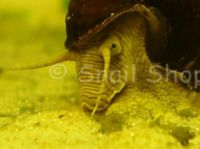Sulawesi Elephant Snail (Tylomelania sp.)
From The Aquarium Wiki
Sulawesi Elephant Snail
Tylomelania sp.
45 Litres (12 US G.)
2.5-11.4cm (1-4.5 ")
Freshwater
7.2 - 8.0
27 -30 °C (80.6-86°F)
8-15 °d
1:1 M:F
2-5 years
Contents
Alternative names
- Elephant Snail
- (Not to be confused with the saltwater Elephant snail.)
Synonyms
- Tylomelania bakara, Tylomelania zeamais, Tylomelania kruimeli, Tylomelania helmuti, Tylomelania sarasin
Sexing
- Male and female. These snails must mate to reproduce. The female has a grooved path on her right side that an egg sac will travel down. The female then eats this egg sac while the baby eats its way out. A tiny, fully formed snail emerges, usually around half a centimeter long.
Tank compatibility
- This snail should be kept with peaceful tank mates as they have long antennae which are enticing to many curious fish. The tank mates should be fish and creatures with similar water parameter requirements.
Diet
- This snail is not picky. It enjoys vegetables, but will eat sinking pellets, wafers, and fallen fish food. This snail occasionally goes after live plants, but mostly if the plants are dying or dead.
Feeding regime
- Feeding every other day will be sufficient for these snails, if they do not need to compete for food. If these fish share a tank with bottom feeders, daily feedings will ensure everyone gets their share.
Environment Specifics
- This snail thrives in a well maintained mature tank with good water flow, 5-15 GH, 5-15 KH, 74-82 degrees Farenheit (usually doing better in the upper range of the temperature), and a pH of 7.2-8.6. Very bright lighting is not appreciated. It prefers a sandy substrate to sift through, and will climb what it can.
Behaviour
- Tends to hide at first. But will venture out after it has settled in, especially if food is provided regularly.
Identification
- This snail has a chunky conical shell that is ridged coloured dark brown or black. Skin is mottled and varies from yellow to orange with black lines or dots to mainly black with white dots and forms a long 'trunk' like snout.
Pictures
Videos
References
- PFK - Issue 2/March 2009, page 20 by Chris Lukhaup
External links
- BreedInUSA.com - USA Breeder & Seller
- Three new species of the freshwater snail genus Tylomelania (Caenogastropoda: Pachychilidae) from the Malili lake system, Sulawesi, Indonesia
- Tylomelania zeamais
- Snailshop - UK Retailer of Sulawesi Elephant Snails]
- Sulawesi
